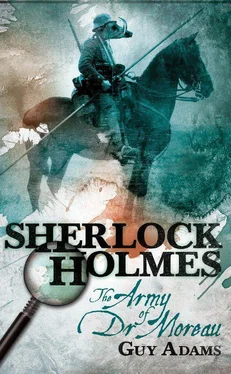“Measles,” I replied, “otherwise known as ‘rubeola’. Now may I go in or do you wish to give me a physical examination first to make sure I haven’t got any?”
“No need to be like that, Doctor,” he replied, picking up his sandwich once more and offering up a particularly floppy corner to his wrinkled mouth. “We all have our role to play after all.”
And there he had a point—given how I had been bemoaning my involvement, how much worse would it have been to be this man? Sitting in doorways and knowing nothing but arguments and grumpy general practitioners. Still, he didn’t have to be such an unbearable prig about it.
I stepped inside to see the Science Club indulging in their usual chaos. Perry had fallen asleep amongst the book stacks, Cavor appeared to be trying to fold a rug into the shape of a typical paper dart, and Lindenbrook was drawing on the back of a bookshelf with some chalk. It seemed inconceivable to me that anything worthwhile could come out of such an obvious collection of lunatics. Later, Mycroft would admit that he paid the cleaner to gather all notes (copying those left on non-portable surfaces such as walls and floors) and hired a team of scientists to decipher their content. Apparently, by so doing, he has blueprints for an improved combustion engine, an entirely new number and the likely outcome of every single cricket match played at Lord’s cricket ground for the next three years—eclectic information, certainly, but groundbreaking nonetheless.
Of Challenger there was, irritatingly, no sign.
“Professor?” I called.
“Get down man!” came the man’s familiar roar and I dropped to the floor as a native spear passed through the space where I had just been standing and imbedded itself in the spine of Litefoot’s Lepidoptera volume three, E-G.
“I nearly had you then!” the professor laughed, bounding through the tables, another large spear in his hand. “I often find physical exercise keeps the brain firing!” he said, as if that was a perfectly adequate explanation. “I have been giving thought to the question of how waxing the feathers can improve the wind resistance.”
I might have suggested that he had enough to think about without branching out into the aerodynamics of pointed weaponry, but I was concerned he’d stab me with the other spear if I did. With Challenger no response was impossible. Instead, I brought him up to date with the investigation and extended Holmes’ offer for him to join us on the night’s mission.
“An expedition!” Challenger exclaimed. “What a splendid idea!” He leaned close. “And if nothing else it will get me away from these idiots!”
Looking over his shoulder, I could see that Cavor was climbing into his upholstered dart, looking for all the world as if he intended to try and fly it out of the building. Perry gave a loud snore, woke himself up and fell over in a cloud of tumbling books.
“I can see why that would appeal,” I said. “We’ll see you at Baker Street at eight, then?”
“I shall be there!”
CHAPTER THIRTY-ONE
Stepping out onto Great Russell Street, I wondered quite what to do with myself. As far as I knew, Holmes was, at that very minute, poking through the evidence at the home of the man he knew to be “Moreau”. Given my absence, the last thing I fancied doing was returning to our rooms and waiting there like a dutiful wife.
I was furious, walking down the street, banging the paving stones with my cane. I would have given anything to have Holmes there, I would have given him a piece of my mind that even he, in his cold and logical way, would struggle to dismiss.
How dare he be so patronising! I would come to the same conclusion, and would feel more vindicated by coming to it under my own steam, would I?
Well, I dare say I could come to the same conclusion. As much as Holmes liked to paint me the idiot, it was a distinctly uncharitable impression. I might not have the same skills as he did, the same leaning towards deduction and the interpretation of data, but that didn’t make me a dullard. We had already decided that there was a limit to who could continue Moreau’s work, either the man himself or someone who had worked closely with him. From what Holmes had said then it was clear that he didn’t believe the culprit to be Moreau himself. That was logical enough. Even if we ignored Prendick’s statement that the man had been torn limb from limb he would be decrepit by now, and the rampaging pig-faced man did not sound like a fellow in his dotage. So we were left with the people who worked with him. Those who studied his methods well enough to be able to duplicate and continue them. So, Prendick or Montgomery, both of whom were also apparently dead, the former to the satisfaction of a police inspector whose opinion I had trusted enough to consider the matter a fact. So what about Montgomery, the drunk, the sometime employee of Mycroft’s Department?
As I walked I became increasingly unaware of my direction. I was simply marching the streets, powering my thoughts with the urgent pounding of my feet.
Ideas were flooding through my head, random words and phrases, mental images. I saw Prendick’s mad writing on the wall of his home: Fear the Law! —the phrase uttered by “Moreau” when wishing to bring his animal army under control at the Houses of Parliament; repeated by Moreau’s creatures on the island, according to Prendick’s manuscript. I thought of that single copy of The Times and the pile of copies of The Chronicle he had kept. That made me pause. I actually stopped stock-still in the street. It didn’t make sense. If he normally read The Chronicle then why had he received a copy of The Times? Had that been sent to him as a threat? Most likely. And what of the religious pamphlet with its bizarre quote? Was that relevant?
I took Prendick’s manuscript from my pocket and flicked through the last few pages. People had to veer around me, tutting and moaning at the distracted man who stood in the middle of the street reading sheets of paper. I barely noticed them as I skimmed through the climax of his report. I read of Moreau’s death and suddenly a piece of the jigsaw fell into place.
“‘Children of the Law,’” I read aloud, quoting Prendick’s words as he faced Moreau’s creatures after the man’s death. Prendick was scared of them, convinced that they would turn on him and Montgomery unless he persuaded them to stay true to the dead man’s principles, Moreau’s “religion”. “He is not dead,” Prendick had continued. “He has changed his shape—he has changed his body … For a time you will not see him. He is … there.” At this point in his account, Prendick describes how he pointed to the sky, suggesting Moreau’s elevation to the divine, “where he can watch you. You cannot see him. But he can see you.” Then that phrase again, “Fear the Law.”
These were familiar words of course, copied onto that religious pamphlet, along with the newspaper, the trigger that had driven Prendick to suicide.
But who had sent them? Montgomery? It must be—he was the only man left to have worked with Moreau.
And then it hit me, and those sheets of Prendick’s manuscript fluttered from my hands as I realised what I had been missing all along. Montgomery was not the only other man to have worked with Moreau. There was another. One who would have had easy access to Prendick’s statement when he had first returned from the South Pacific, who would have found it only too easy to trace him and send him a copy of a newspaper and a veiled threat. There was one man who had hidden in plain sight throughout the whole affair. Knowing it—and like Holmes has said in the past, even without proof I did know it, it was nothing less than a fact to me— the sense of unity that washed over my mind was incredible. For all his loathsome behaviour, Holmes had been quite right, in that to have come to the realisation myself was something that quite simply took my breath away. I knew who had been behind it all.
Читать дальше











